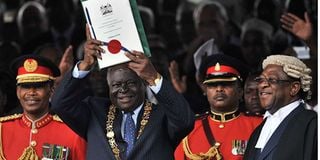Katiba@14: Hits and misses

Then President Mwai Kibaki during the promulgation of the Constitution at the Uhuru Park grounds in Nairobi on August 27, 2010.
What you need to know:
- The 2010 Constitution has been credited for some of the country’s major changes.
- Azimio la Umoja said the 2010 Constitution was seen as a “beacon of hope” for Kenya.
August 27, 2010 was a euphoric moment. The country witnessed a new dawn when a new Constitution was promulgated.
A constitutional referendum was held in the country on August 4, 2010, and an overwhelming 67 per cent of Kenyans voted in support of the document widely described as the most progressive in the world.
The 2010 Constitution has been credited for some of the country’s major changes, among them decentralisation of resources to the 47 counties and a more independent Judiciary as well as expanded constitutional rights and freedoms.
In the past, it was rare for the courts to rule against the government. But under the 2010 Constitution, both President William Ruto and his predecessor, Uhuru Kenyatta, suffered a string of losses in the courts, including on their pet projects such as affordable housing and the Building Bridges Initiative (BBI), respectively.
But as the country marks 14 years since the promulgation of the Constitution, there is fresh clamour for good governance — largely by Gen Zs — who held the country hostage through nationwide anti-government protests for more than a month.
This forced President Ruto to make major concessions, including declining to sign the Finance Bill, 2024 and sacking his entire Cabinet except Prime Cabinet Secretary Musalia. The Attorney-General was also sent packing.
Claims of the Executive interference with the independence of the Judiciary and the Legislature have emerged, giving rise to active public participation and litigations.
Runaway corruption and slow pace of implementation of some of the major constitutional provisions have also hampered the full realisation of benefits as envisioned in the 2010 Constitution.
The two-thirds gender principle has also remained elusive 14 years later. Various attempts to have the two-third law enacted — stretching all the way from the 10th, 11th and 12th parliaments — faced a bumpy ride.
Articles 27 (8) and 81(b) of the Constitution states that not more than two-thirds of members in appointive and elective public bodies are of the same gender.
Constitutional lawyer Bobby Mkangi, who served as a commissioner in the nine-member Committee of Experts (CoE) on the review of the Constitution, said that the country did well in the first five years in putting the “hardware” in place. He said constitutional offices, county governments, among other bodies, were created.
He, however, said that the political class has been frustrating implementation of the letter and the spirit of the law, adding that those in power have continued to contravene the law.
“We can’t clap for ourselves because every day you wake up, there are protests. This is basically a clamour for better governance,” Mr Mkangi said.
“One institution that has failed this country miserably is Parliament. Lawmakers are mandated by the law to keep corruption and the national debt in check so that we don’t get to the position that we are in,” he added.
However, the lawyer said that one thing worth celebrating is the awakening of the young generation to hold leaders accountable.
“In their demonstrations, you can tell the Constitution is alive in them. The older generation has ignored and shunned the document,” he said.
The unprecedented withdrawal of an unpopular tax plan, the dissolution of the Cabinet, the co-option of the opposition into government — despite the ruling party vowing never to follow that path — and the social media youth-led protests, are some of the changes seen in Kenya in the recent past.
Hardly anyone predicted that 2024 would be the year of accountability in Kenya’s political space, sometimes through methods that could be considered unusual such as sharing publicly mobile phone numbers of those in authority. Budget documents, government expenditures and the flashy lifestyle of those in power have also come under sharp scrutiny now more than ever before.
On Monday, Azimio la Umoja One Kenya Coalition co-principal Kalonzo Musyoka, who is also the Wiper leader, said the 2010 Constitution was seen as a “beacon of hope”, and a new beginning that promised to heal the wounds of our past.
“As we reflect on the past 14 years, we must celebrate our achievements. Devolution has brought services closer to the people and the Bill of Rights has provided a framework for promotion of human dignity,” said Mr Musyoka.
However, he said, even though the law provides for public participation, many Kenyans still feel excluded in decision-making processes, adding that there have been attempts by the Executive to interfere with the Judiciary.
Machakos Deputy Governor Francis Mwangangi said county governments are struggling due to delayed disbursement of cash by the national government.





